The Master in Fundamental Physics and Applications is a 120-ECTS program spread over four semesters, comprising seven specialization tracks. It provides opportunities to pursue a doctoral thesis (PhD) in an academic research laboratory—whether in Lyon, elsewhere in France, or abroad—or to enter industry at the Master’s (Bac+5) level.
First Year (M1) – Three Tracks (starting in 2025-2026)
From the start of the 2025-2026 academic year, three tracks are offered in the first year (M1):
- “Physique appliquée” (Applied Physics)
Grants access to the M2 specializations CDIM and PHYSMAN - “Matière et Lumière, Quantique et Complexe” (Matter and Light, Quantum and Complex)
Grants access to the M2 specializations MAX and Q-LIGHT - “Univers et interactions fondamentales” (Universe and Fundamental Interactions)
Grants access to the M2 specializations ASTRO, COSMO, and SUBA
Second Year (M2) – Seven Specializations
In the second year (M2), students choose from seven specializations:
- Astrophysique (ASTRO) (co-accredited with Université de Montpellier)
- Conception, Développement Instrumental, Mesure (CDIM)
- Cosmologie et Univers à haute énergie (COSMO)
- Matière Complexe (MAX)
- Quantique Lumière et Interactions (Q-LIGHT)
- Physico-chimie des Matériaux pour le Nucléaire et les énergies nouvelles (PHYSMAN)
- Physique Subatomique (SUBA)
Focus on Fundamental or Applied Physics
The tracks oriented toward fundamental physics (ASTRO, COSMO, MAX, Q-LIGHT, SUBA) offer training geared toward both fundamental and applied research. Main topics include modern astrophysics (instrumentation and numerical simulations), advanced physics (complex matter, condensed matter, optics, photonics), and theoretical/experimental approaches to physics at the smallest and largest scales.
The CDIM track, for its part, prepares students for immediate employability by emphasizing in-depth and applied physics skills focused on instrument development for physical and physicochemical measurements. Offered as a work-study program, it delivers multidisciplinary training aligned with industry needs.
Finally, the PHYSMAN track develops expertise in the synthesis, aging, and characterization of materials for nuclear energy and new energy sources. It is designed for either direct integration into the nuclear sector or further doctoral studies within major nuclear organizations or research laboratories.
Program Structure
During the first semester, common courses are offered to all students, alongside a pre-specialization in either fundamental or applied physics. Students choose their specific track in the second semester, where some coursework remains shared. In the second year (M2), each track has its own specialized curriculum, although certain courses are still shared in Semester 3.
Language Options
The program is offered in French and English, with course units taught in one or both languages during the first semester. Non-French-speaking international students have access to French language instruction, while French-speaking students can also benefit from courses taught in English—particularly useful for those planning a study-abroad experience during their degree.
